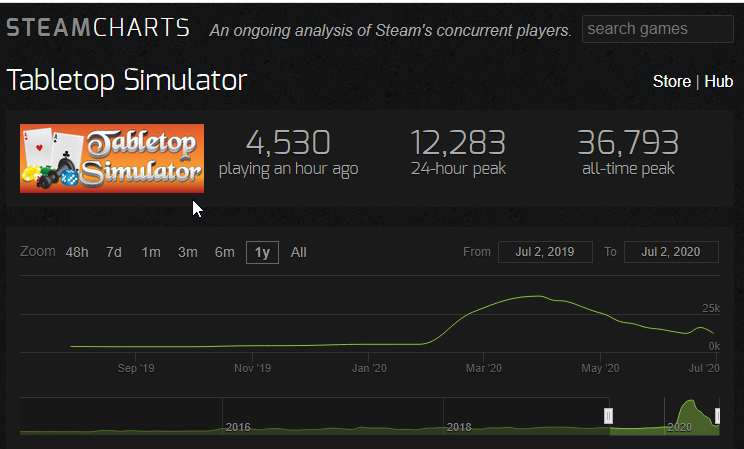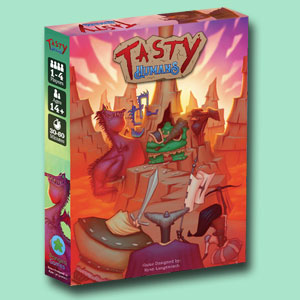If you stay in the board game industry for long enough, you will hear your fair share of conventional wisdom. Board gamers like minis. Conventions are good for promoting your game. The list could go on forever.
Some of this wisdom is true, and some is not. The veracity of advice you hear will change year over year, and even month over month. This is not just because we’re experiencing an unprecedented shake-up in day-to-day life because of the coronavirus. It’s just a simple fact of life: the rules always change.
To succeed in making the game you want or building a business, you have to constantly question both your own assumptions and the conventional wisdom you hear. Listen to everyone, but maintain some skepticism. Be skeptical even of what you read here!
Looking for more resources to help you on your board game design journey?
Here you go: no email required!
Like this writing style?
Check out my latest blog on marketing here.
The Flawed Assumption That Many Gamers Think is True
I’ve noticed a peculiar trend in the hobby board games industry. The hobby board game industry was said to pull in about $1.5 billion in 2018. When you dig deeper, you realize that hobby games are a very small part of the overall tabletop games industry.
The tabletop games industry is actually $12 billion in size. The lion’s share of that figure went to Chess, Scrabble, Monopoly, and Ludo. For comparison, collectible card games as a category, including Magic the Gathering, represent about $625 million.
In short, the vast majority of the games people talk about on Board Game Geek make up a pretty small segment of the hobby board game industry as a whole. Yet it gets even stranger. Of that $1.5 billion, $200 million was raised on Kickstarter.
So in summary, what you see on Kickstarter makes up a fraction of the global $12 billion market. As little as 1.6%, in fact. Board gamers focus a lot on that small sliver of the industry, while ignoring mass market games and the surprising amount of best-selling products on Amazon.
This leads to a massive distortion in thinking. Hobby board gamers often think that games have to be made in a specific way, ignoring successful products along the way. Azul is a fantastic game, but What Do You Meme is making the money printer go brrr.
Kickstarter Isn’t the Same as It Was in 2010 or Even 2017
Kickstarter used to be a lot more welcoming toward board game projects that were not ready to print. Over time, though, production values went up and it was expected that your game would be complete before you launch.
As recently as 2014, Jamey Stegmaier advocated for leaving projects “pliable” so that backers could request meaningful changes to the game during the campaign. At the time, that was best practice. His advice was spot-on. However, to launch a “90% complete project” would make backers suspicious and hesitant since more complete options exist.
Kickstarter is slowly transitioning into a store, at least functionally if not in name. I don’t think this is a bad thing – not at all! Stores provide more consumer protections than 2010-style crowdfunding campaigns. Yet it does mean that many creators need to pair reading classic advice from 2009-2019 with an actual fresh look at Kickstarter as it is right now in 2020.
Board Game Media is Important, But You Can’t Rely on It to Generate Leads
I’ve seen a lot of board games get reviewed positively by Dice Tower and Geek & Sundry, only to fail on Kickstarter. I’ve actually privately consulted with some people in this situation. Using data available to me, I’ve found that most have made no mistakes with their campaign pages and indeed have high conversion rates. That is to say, people who see the page are buying.
So what gives? Well, it’s a lead generation problem! As it turns out, a lot of people who are watching the videos of these big board game media outlets and reading their articles are not actually visiting the Kickstarter campaigns.
This is why I’m very bullish on advertisements. They are proven ways to generate traffic. If you don’t get a return on your ad spending, you can always cut them off. Many media outlets, on the other hand, you end up paying a fee in advance and not actually getting a return on your money. This is okay if you’re trying to get “social proof” that your game is good, but it’s not okay if you’re trying to generate leads!
We Have No Idea What Virtual Cons Will do to the Board Game Industry
The board game industry has historically been thought of as a “boots on the ground” industry. I’ve always been a bit skeptical of that narrative for reasons I’ve mentioned above such as missing Amazon as an eCommerce outlet. Plus people tend to forget about the costs of flying, lodging, eating, attending, and setting up booths. Networking is good, but doing so through conventions can be very expensive!
Nevertheless, it’s undeniable that a lot of people have made important connections and friendships at board game conventions. Put the convention online, though, as so many are doing, and…well, I have no clue what that’s going to do to the experience!
Nobody really knows what’s going to happen now that board game conventions are online. The only thing I can say for sure is that digital marketing is going to be paramount, since the main two venues people go to in order to buy board games – conventions and gaming stores – are going to be closed (or dangerous to go to) for a while.
Tabletop Simulator & Tabletopia Are Growing

Because of the coronavirus pandemic, it is generally a good idea not to gather with others right now. That means a lot of board gamers can’t go to cons, local meet-up groups, or even over to their friends’ houses. Thus, a record-breaking number of people have downloaded Tabletop Simulator in the last few months.
This surge has been so meteoric that it’s created an entirely new niche within the tabletop gaming world: virtual board game creators. There’s no telling what else is going to come out of this recent trend. All we know for certain is that board gaming is likely to be inexorably and inevitably changed, even if that means nothing more than the birth of 10,000 board game live-streamers.
Final Thoughts
The rules of the board game industry are always changing. It’s always been that way. Every other industry is like that, too.
To be successful and to meet others’ needs, we must always check our assumptions. Always question the conventional wisdom and don’t believe everything you read!






One thought on “In the Board Game Industry, the Rules Always Change”
This is an extremely well thought out article. Appreciate the advice you set forth here.